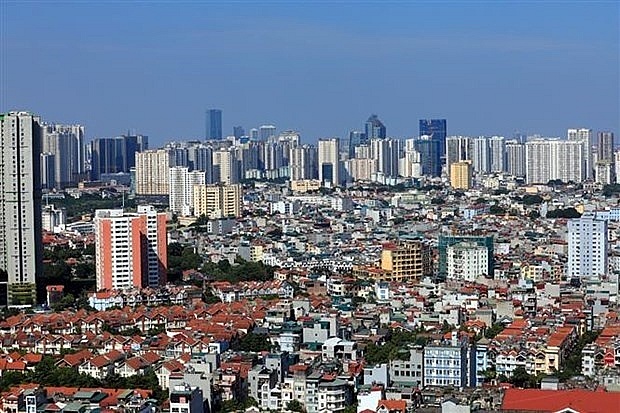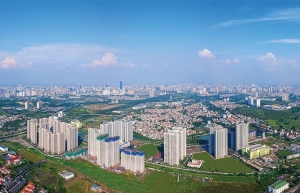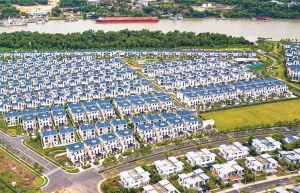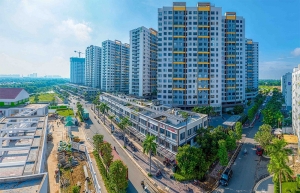Unique incentives help unlocking real estate capital
Speaking at the Vietnam Real Estate Conference 2022 last week in Ho Chi Minh City, Dinh Minh Tuan, regional director for the South at batdongsan.com.vn, said that in Q4, the city only had about 300 apartments on sale, with the consumption rate at less than 25 per cent.
“This has been the quarter with the lowest apartment transaction rate in the last five years, despite the end of the year usually being the hottest time for the market,” Tuan said.
According to the Ministry of Construction, there are currently more than 1,000 projects with legal problems that have not been implemented, causing a drop in supply. By the end of the third quarter, the whole country had just over 100 projects in progress, while around 60 commercial housing projects were completed – half of the same period last year.
According to Le Hoang Chau of the Ho Chi Minh City Real Estate Association, legal issues are the biggest culprit, accounting for 70 per cent of delays in real estate projects.
Vietnamese legislators are currently looking to update the Law on Land, which is hoped to come into effect in 2023. While waiting for revised laws to arise, the business community requests that the government shorten the time for administrative proceedings.
“Currently, a project needs 3-5 years to finish all administrative procedures. This is too long, and businesses lose their opportunities and costs increase,” Chau said.
 |
| A view of a residential area in Hanoi (Photo: VNA) |
Many businesses believe that along with building a synchronous legal system, it is also necessary to develop a standard process on investment procedures for urban and commercial housing projects.
Simultaneously, enterprises also requested the government to allow a pilot to allow investors to transfer all or part of a project when they obtain a certificate or decision on land allocation or land lease in order to help restart long-delayed projects.
At the same time, provincial people's committees need to urgently issue specific regulations on conditions, criteria, scale, and ratio to separate into independent projects for public land areas interspersed in housing projects.
In the context of high bank interest rates, low credit room, and pressure on bond maturity, investors are actively building long-term adaptation plans to stimulate market demand.
Specifically, Novaland has issued attractive incentives including giving an interior package of VND1.5 billion ($63,300) to its customers in Aqua City, a smart eco-urban area east of Ho Chi Minh City.
In Thu Duc city, Saigon Construction JSC, the investor of the Salto Residence project, also offers an incentive for buyers in which they pay only 40 per cent of the unit’s value to receive the house. The remainder will be sponsored by the bank, with a loan grace period of zero interest for 30 months.
Elsewhere, Phuc Dat Production and Trade has offered an unprecedented policy in which anyone who buys two units or more at Phuc Dat Connect 2, located in Binh Duong city, will be gifted with 1,000 sq.m of land in Gia Lai province.
In Hanoi, the developer of Hanoi Melody Residences in Hoang Mai district offers a discount of over 30 per cent for buyers who pay 95 per cent of the unit value upfront.
 | Wheels in motion to resolve impediments in real estate After a period of sluggishness over the last couple of years, the real estate market has not yet rebounded as anticipated and has even shown symptoms of a standstill due to legal concerns. |
 | Liquidity risk topping realty concerns Vietnam will have to tackle a raft of liquidity issues facing realtors before the country’s stock market can rebound, an economic forum heard earlier this month. |
 | Real estate adapting to fresh challenges Real estate businesses are tackling new challenges head on by extending debt, converting loan packages with new interest rates, and paying bonds with real estate. |
 | Developers seeking further support in approaching loans Many real estate businesses are concerned about the feasibility of approaching loans despite the State Bank of Vietnam increasing the credit room, simultaneously requiring commercial banks to reduce payable interest. |
What the stars mean:
★ Poor ★ ★ Promising ★★★ Good ★★★★ Very good ★★★★★ Exceptional
Related Contents
Latest News
More News
- Saigon Centre gains LEED platinum and gold certifications (February 12, 2026 | 16:37)
- Construction firms poised for growth on public investment and capital market support (February 11, 2026 | 11:38)
- Mitsubishi acquires Thuan An 1 residential development from PDR (February 09, 2026 | 08:00)
- Frasers Property and GELEX Infrastructure propose new joint venture (February 07, 2026 | 15:00)
- Sun Group led consortium selected as investor for new urban area (February 06, 2026 | 15:20)
- Vietnam breaks into Top 10 countries and regions for LEED outside the US (February 05, 2026 | 17:56)
- Fairmont opens first Vietnam property in Hanoi (February 04, 2026 | 16:09)
- Real estate investment trusts pivotal for long-term success (February 02, 2026 | 11:09)
- Dong Nai experiences shifting expectations and new industrial cycle (January 28, 2026 | 09:00)
- An Phat 5 Industrial Park targets ESG-driven investors in Hai Phong (January 26, 2026 | 08:30)

 Tag:
Tag:


















 Mobile Version
Mobile Version